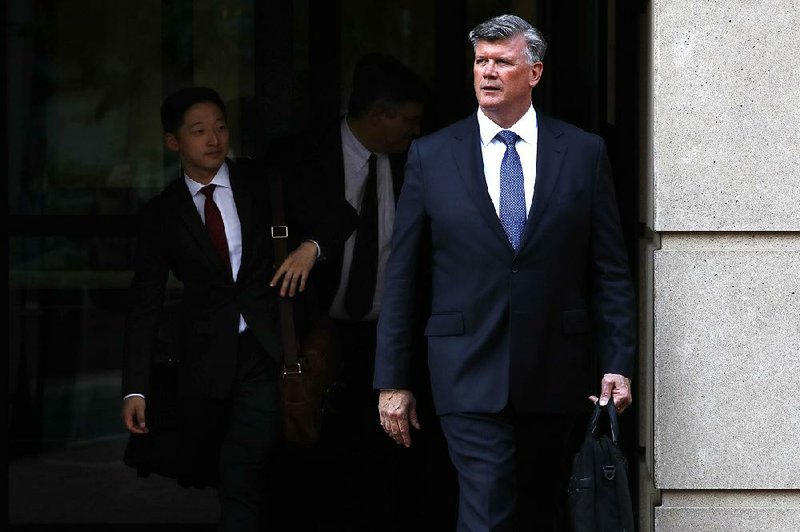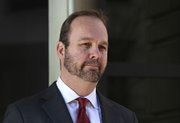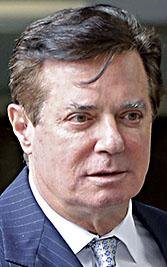ALEXANDRIA, Va. -- The courtroom showdown between Paul Manafort and his former right-hand man Rick Gates grew personal Tuesday as a defense lawyer forced Gates, the prosecution's star witness, to admit he had a trans-Atlantic extramarital affair and embezzled money to live beyond his means.
During his second day on the witness stand, Gates detailed the lies, phony documents and fake profits he claims to have engineered at Manafort's direction. Manafort, seated at the defense table, stared intently at his former protege and business partner, who has avoided Manafort's gaze despite their proximity inside the federal courthouse in Alexandria, Va.
Gates' testimony is central to prosecutors' case as they seek to prove that Manafort, President Donald Trump's former campaign chairman, committed bank fraud and tax crimes. Gates has testified that most of his crimes were committed on behalf of his former boss, while others were self-serving. He pleaded guilty in February as part of a deal with special counsel Robert Mueller.
As the first trial to emerge from the special counsel's investigation, the Manafort case is a critical public test of Mueller's work. His team of prosecutors and agents continues to investigate Russian interference in the 2016 presidential election and whether any Trump associates conspired with those efforts.
Kevin Downing, the lead defense lawyer, began cross-examination Tuesday by hammering at Gates' credibility, demanding an exact accounting of when he lied to the government and pleaded guilty to the charge of doing so. Gates seemed to struggle to articulate that timeline, prompting Judge T.S. Ellis III to intervene.
Downing also pressed Gates on the number of interactions he had with the special counsel's office -- Gates estimated around 20 meetings -- and who from the office confronted him about giving a false statement.
But the most jarring testimony Tuesday came when Downing questioned Gates about his affair.
"There was another Richard Gates, isn't that right? A secret Richard Gates?" Downing asked.
The witness, who seemed to immediately understand the lawyer's hint, began speaking in a quiet, strained voice, saying that about 10 years ago, he had "another relationship" -- an extramarital affair.
Asked if that affair had taken place in London, Gates said it had occurred there and other places. For about two months, Gates said, he kept a separate apartment in London and admitted he had flown first class and stayed in luxury hotels as part of that relationship.
Gates also admitted he embezzled from Manafort. When Downing asked if he stole as much as $3 million, Gates replied that he thought the figure was lower, but agreed that he had taken money from Manafort without his permission.
Earlier in his testimony, Gates said he embezzled hundreds of thousands of dollars while working for Manafort.
Many of Downing's questions sought to buttress Manafort's central defense strategy -- that Gates, not Manafort, is the real villain, a man who told so many lies and stole so much money he could not remember all of his illegal activity.
In one of the most heated exchanges, Gates compared himself favorably to Manafort, suggesting he had chosen a better path by cooperating with the FBI.
"After all the lies you've told and fraud you've committed, you expect this jury to believe you?" Downing asked.
"Yes," Gates responded flatly.
"I'm here to tell the truth," Gates said. "Mr. Manafort had the same path," he said, adding later: "I'm trying to change."
At other moments, Gates seemed reluctant to admit the extent of his wrongdoing.
When Gates called a payment "an unauthorized transaction," Downing asked him, "Why can't you say embezzlement?"
Gates replied: "It was embezzlement from Mr. Manafort."
Ellis, as he has repeatedly through the trial, interjected during Gates' cross-examination.
When Gates said that Manafort "was very good at knowing where the money was and where it was going," Ellis remarked, "He didn't know about the money you were stealing, so he didn't do it that closely."
Downing presented Gates with a document showing money transfers conducted between 2010 and 2014, some of them large dollar amounts out of Cypriot accounts where Manafort kept his money. Gates acknowledged the list included "unauthorized transfers," but could not specify which ones.
At one point, Gates said the document lacked enough detail for him to offer better answers. But the line of questioning prompted him to say repeatedly that he did not recall the money transfers in question, transactions, Downing claimed, about which the special counsel had previously asked Gates. Downing said Gates' memory appeared much clearer when it was a prosecutor asking questions.
"Have they confronted you with so many lies you can't remember any of it?" Downing asked.
Downing accused Gates of swiping money from Manafort's firm to take trips to Las Vegas, to buy sound equipment and to shop at a Whole Foods grocery store in Richmond, Va., where Gates lives with his family. Gates said he did spend the firm's money on those things but that he did not believe it came from offshore accounts. The Las Vegas trips were for a movie production venture, he said, not for fun.
Gates said he wrote a letter falsely claiming his company would invest a large sum in a friend's movie project.
"I did it as a favor," Gates said.
"You committed fraud as a favor?" Downing asked skeptically.
"I did; I admitted to that," Gates responded.
At another point, Gates conceded he might have swindled the Trump inaugural committee as well. When Downing asked if he submitted personal expenses for reimbursement, Gates replied, "It's possible."
Downing moved quickly from one topic to the next, and at times the witness seemed confused as to which fraudulent activity they were discussing.
The strategy worked at least once, when Gates contradicted himself within a matter of minutes. Asked about a series of wire transfers, Gates testified that he submitted a false invoice for "professional services" to an offshore bank to initiate a transfer of $65,000 from the Manafort-controlled Global Endeavor Inc. to a different company, and from there into Gates' account.
In another instance, Gates submitted a false invoice to cause Global Endeavor to transfer $125,000 into a different company Gates controlled.
Gates tripped up as he explained the reason for these transfers, repeatedly agreeing that some of the money was unauthorized but also saying the transfers were reimbursements for business expenses while some were bonuses from Manafort.
Downing asked why Gates would call these transfers reimbursements.
"I was, in essence, living beyond my means," Gates replied.
COOPERATION DEAL
Gates worked for Manafort for more than a decade before the pair were indicted last year on bank-fraud and tax charges. In February, Gates decided to plead guilty to lying to the FBI and conspiring against the United States. Under sentencing guidelines, he could get roughly five to six years in prison for those crimes, but he said he hopes his cooperation with the government will result in less time behind bars.
The accusations against Manafort and Gates mostly stem from their work helping to elect Viktor Yanukovych, the former president of Ukraine, and other pro-Russia forces in Ukraine, and to secure business ventures with the oligarchs backing those politicians.
But on Tuesday, Gates testified that Manafort also was paid $4 million a year to help Yanukovych govern after he was elected president in 2010.
It is unclear how long the arrangement extended.
At the judge's instruction, the trial has largely stayed away from mentioning the Trump campaign or Russian interference in the 2016 election, but prosecutor Greg Andres asked Gates a series of questions about what happened after the election, when Gates went to work for Trump's inauguration committee.
Andres showed Gates emails from Manafort requesting Gates use his position in the Trump campaign to offer favors to Stephen Calk, the founder and CEO of Federal Savings Bank, one of the banks that extended Manafort a loan in 2016. Those loans are a key issue in the trial because Gates has testified that he helped engineer false statements inflating Manafort's income to qualify for the loans.
First, Calk's name was added to a list of national economic advisers to the campaign. Then, in November 2016, Manafort wrote Gates: "We need to discuss Steven Calk for Sec[retary] of the Army. I hear the list is being considered this weekend," indicating that he wanted Gates' help getting Calk considered for the job.
Manafort, in a December 2016 email marked "urgent," sent Gates a list of people he wanted invited to the inauguration. The list included Calk and Calk's son.
Earlier Tuesday, Andres walked Gates through evidence of what prosecutors say were years of lies designed to hide much of Manafort's money from the IRS -- and then, when his money ran out, lies to banks to obtain loans to pay for his lavish lifestyle.
Prosecutors offered emails and other documents aimed at supporting Gates' claims that Manafort was intimately involved with the fraudulent schemes.
One document showed that in 2015, when his income was drying up, Manafort was upset when he learned how much he apparently owed in federal taxes; one estimate showed that Manafort would owe $215,000 in taxes for income he reported in 2014. He wrote to Gates: "How could I be blindsided like this. You told me you were on top of this. We need to discuss options. This is a disaster."
To lower Manafort's tax bill, Gates testified, they lied and claimed $900,000 in income he had received was actually a loan.
Gates testified that Manafort personally falsified a 2016 company profit statement to get a loan. The original statement had shown the firm lost over $600,000 that year -- during a time when Manafort took the job of Trump's campaign chairman with no salary. The statement Manafort sent back claimed the firm showed a profit of about $3 million, Gates testified.
In his testimony, Gates has admitted to repeatedly telling lies and submitting false documents, but insisted he was following his boss's instruction.
Earlier that year, Gates said he doctored a 2015 profit statement after an unsuccessful attempt to get Manafort's bookkeeper to do it for him. Gates eventually went around the bookkeeper to get a copy of the correct document, which he then edited, adding $6 million in fictional income to make the company look more profitable.
"Was it accurate?" Andres asked.
"It was not," Gates replied.
"Was it false?" Andres continued.
"Yes," Gates said.
It is unclear whether Manafort will take the stand in his own defense. His lawyers would not say. The prosecutors said they expect to wind up their case this week.
Gates is expected to return to the witness stand today.
Information for this article was contributed by Rachel Weiner, Matt Zapotosky, Rosalind S. Helderman, Devlin Barrett and Justin Jouvenal of The Washington Post; and by staff members of The New York Times.
A Section on 08/08/2018


